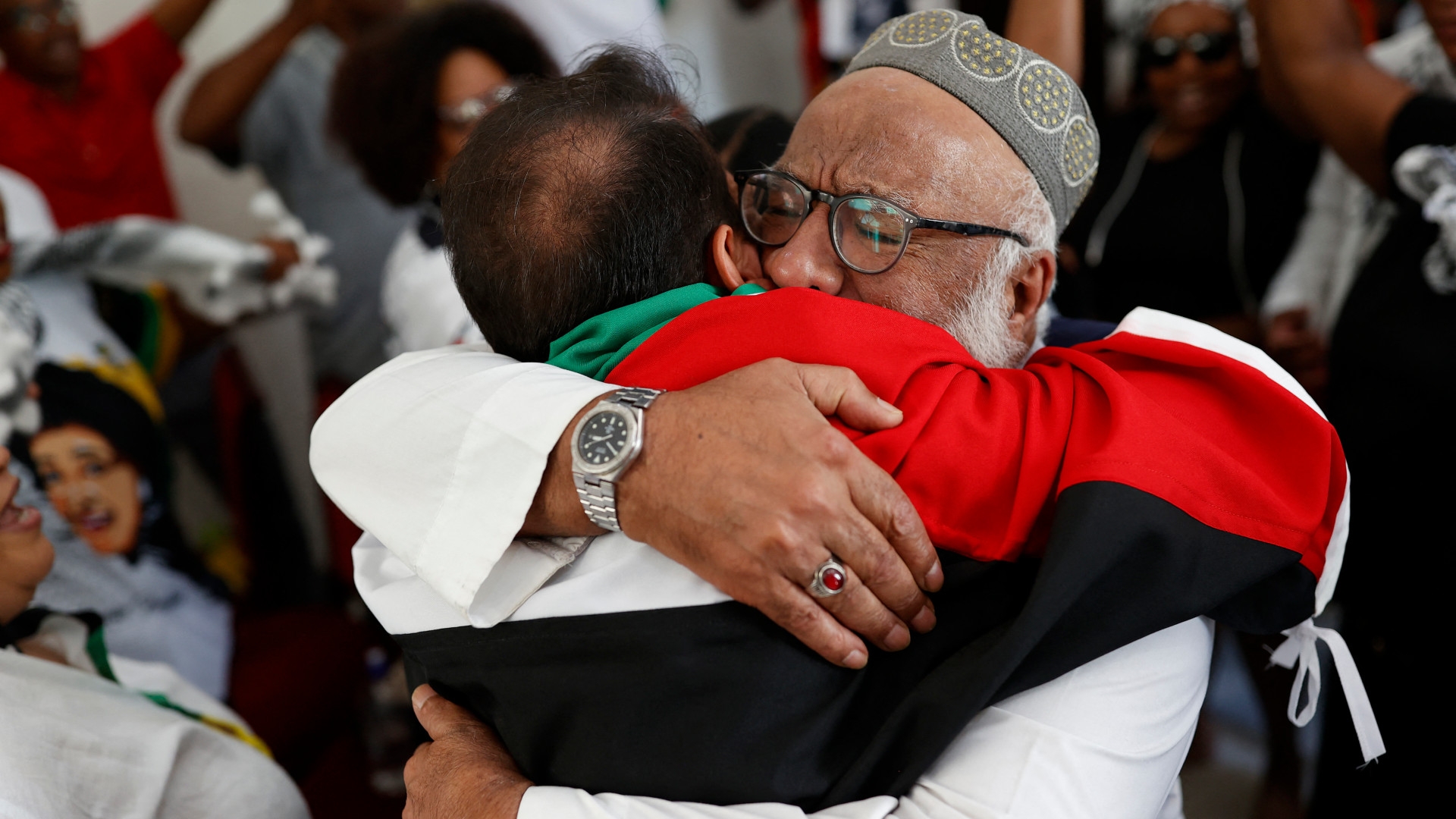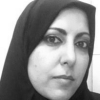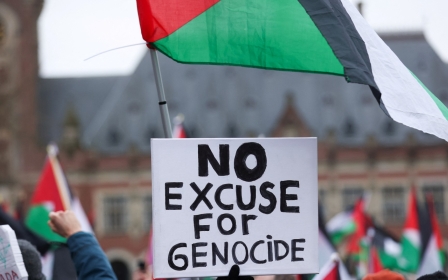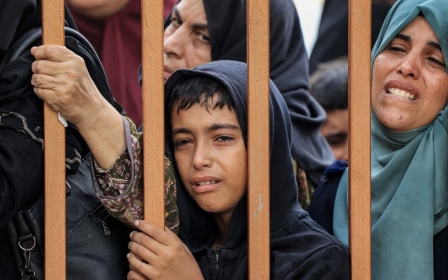ICJ ruling: South Africa's triumph bears an incredible shift in the imperial global order

On Friday, the International Court of Justice (ICJ) in The Hague delivered what was expected to be a groundbreaking order on provisional measures in South Africa's genocide case against Israel, ruling mainly in favour of South Africa on interim measures.
The court, however, failed to call for an immediate ceasefire, as was hoped, and instead adopted softer, diplomatic language, calling on Israel to take measures to prevent acts of genocide in Gaza.
The highly-anticipated ruling had been viewed as consequential for recognising the genocide being committed by Israel against Palestinians. An equally pressing question has been whether the highest world court is capable of ruling fairly and unimpeded by political leanings, placing the entire international order on trial.
The absence of the word "ceasefire" certainly indicates some level of political compromise to appease Israel's western allies, who have adamantly maintained neutral tones of "humanitarian pauses" without taking steps to protect innocent civilians.
However, the ruling has been largely hailed as a decisive victory for Palestinians and the Global South against a western imperial order. Despite aggressive statements and caution of consequences from the US administration, South Africa persevered with the case, recalling its moral, ethical and legal obligations to prevent genocide and immobilise the Israeli carnage in Gaza.
New MEE newsletter: Jerusalem Dispatch
Sign up to get the latest insights and analysis on Israel-Palestine, alongside Turkey Unpacked and other MEE newsletters
Provisional measures
On 29 December, South Africa filed a lawsuit with the ICJ, requesting an urgent injunction against Israel on the grounds that the Israeli attacks on Gaza since 7 October violate the Genocide Convention, to which both countries are party.
In a televised address to the nation after the ruling, South African President Cyril Ramaphosa hailed the court's decision as a victory for international law, human rights and justice
South Africa argued its case on 11 January, followed by Israel's response the next day. South Africa's legal team was commended globally for the impressive, clear arguments that were presented to the court, while many found the Israeli response emotive and lacking evidence.
Israel's arguments also hinged on jurisdictional issues that were refuted by the South African team. Following South Africa's presentation, several other countries pledged support and interest in joining South Africa, demonstrating a necessary shift in countries of the Global South utilising instruments of global governance that imperial political agendas have dominated.
"Israel enjoyed institutional impunity by the big powers for various breaches of international law, including war crimes. That institutional impunity has been pierced, and for the first time, they have to actually account for their actions. This also challenges the court to allow countries like South Africa to ventilate these concerns without spurious political decisions masquerading as jurisdictional issues continuing to block the systems of global governance," said Zane Dangor, director general of the Department of International Relations and Cooperation and member of the South African team to The Hague.
Follow Middle East Eye's live coverage of the Israel-Palestine war
Among other things, South Africa requested that the ICJ rule on an interim injunction on nine measures, including the ordering of an immediate halt to all Israeli military operations against Gaza, taking all reasonable measures to prevent the genocide of Palestinians, and desist from the commission of acts constituting genocide.
Examples include the killing of Palestinians or causing them severe bodily and mental harm; deliberately inflicting on Palestinians conditions of life to bring about physical destruction in whole or in part; and imposing measures intended to prevent births of Palestinians.
Another provision requires unimpeded access for Palestinians to humanitarian assistance, including food, water, fuel, medical and hygiene supplies, as well as shelter and clothing. Finally, it calls for the preservation of evidence of genocide and punitive action against incitement to genocide.
In reading the judgement, ICJ president Joan Donoghue addressed the critical question of the jurisdiction of the court to hear the case, affirming that the South African case certainly has merit and that South Africa had adequately communicated their dispute with Israel in numerous bilateral and multilateral engagements. She also quoted from Israeli government statements that acknowledged the suit brought by South Africa, calling it not just "legally and factually incoherent, but obscene".
This signified that the two parties held opposing views in terms of their obligations to the Genocide Convention. Thus, she contended that the dispute qualified to be brought before the court. This was seen as a victory for South Africa, as Israel's petition to the court to have the matter thrown out was rejected.
Judge Donoghue reaffirmed that the court is presently not expected to make a finding on whether acts of genocide have taken place but to assess whether some acts and omissions that Israel has committed provide an indication that during the proceedings of the court, it is plausible that crimes may have been perpetrated.
Her reading of the judgement identified the Palestinian population in Gaza, consisting of over two million people, as forming a substantive part of a group (in line with the definition within the Genocide Convention). Her statement notably included recognition of reports from credible sources of the excessive death toll, the extensive infrastructural damage, the displacement of 1.7 million Palestinians, the description by UN under-secretary-general Martin Griffiths that Gaza has become a place of "death and despair", and that Gaza is uninhabitable, with 93 percent of the population facing a hunger crisis and other deadly consequences.
She recalled inflammatory statements of intent by Israeli Defence Minister Yoav Gallant as early as 9 October, which signified the deliberate siege of Gaza, subjecting the enclosed region to no food, no electricity, no fuel and later referring to Palestinians as "human animals".
She reiterated that the power of the court would not be to determine breaches of the convention currently but to determine an indication of a real imminent risk of rights being violated. The possible worsening of the situation, as warned by senior UN officials, includes the mass displacement of Palestinians and the proliferation of epidemics as a result of the collapse of the healthcare system, while also noting that Israeli Prime Minister Netanyahu has repeatedly said that the war will take many more months.
Implied 'ceasefire'
While the preamble to ruling was forceful and determined, creating the impression that all or most of South Africa's requests would be acceded to, the court ultimately softened the language upon the final ruling, ordering Israel to take immediate practical measures within its power to prevent genocide, stop its military from perpetrating such acts, ensure the provision of humanitarian aid, prevent and punish public incitement and to report to the court on the measures taken within a month of the ruling.
South Africa's Foreign Minister Naledi Pandor led the delegation to the ICJ to hear the ruling at the Peace Palace. Speaking ahead of the decision with optimism, she emphasised that the core purpose of South Africa's case was "to highlight the plight of the innocents in Palestine and also alert the international community to the great harm that is being done to the people of Palestine, and also draw attention to the lack of justice and freedom over many decades, much of which has been ignored by the world. Today, the Palestinian issue is front and centre of the world, and that is a significant achievement of this case brought by South Africa."
Following the court ruling, Pandor appeared somewhat frustrated with the absence of the word "cessation" but stopped short of expressing disappointment. Instead, she re-emphasised that the case was about ensuring that international bodies exercise their responsibilities to protect civilians and prevent massive levels of harm while reactivating the Genocide Convention in a practical way to create a world where the resort to arms is no longer an option.
She appeared self-consoling in determining that the court ruling, while not explicitly calling for a ceasefire, implied such, as the provisions to prevent genocide in accordance with the court ruling cannot be implemented barring a ceasefire. She expressed satisfaction with the provisional orders, which would compel Israel to report on their measures to prevent genocidal acts.
In a televised address to the nation after the ruling, South African President Cyril Ramaphosa hailed the court's decision as a victory for international law, human rights and justice, following the unprecedented action taken by South Africa to take Israel to the world court despite not being party to the conflict.
He affirmed that South Africa welcomed the decision, and stated: "This marks an important first in our quest to secure justice for the people of Gaza. We expect Israel, as a self-proclaimed democracy and a state that respects the rule of law, to abide by the measures handed down by the International Court of Justice. After more than half a century of occupation, dispossession, oppression and apartheid, the Palestinian people's cries for justice have been heeded by an eminent organ of the United Nations."
He added: "Today, Israel stands before the international community, its crimes against the Palestinians laid bare... We know what apartheid looks like, we experienced and lived through it. We, as South Africans, will not be passive bystanders and watch the crimes that were visited upon us being perpetrated upon other people elsewhere. We stand on the side of freedom for all. We stand on the side of justice."
Israel remained defiant in response to the court's decision, implying a refusal to abide by the orders in the implementation of provisional measures and leaders dismissing the court as "antisemitic".
Mixed reactions
In Gaza, the occupied West Bank, and across various capitals around the world, there was an outpouring of joy ahead of the court's decision, but once the ruling was made, there were mixed reactions.
While the US and its partners have given Israel carte blanche to pursue its settler-colonial policies, the interim decision by the world court has far-reaching international ramifications
Civilians who have been subjected to 112 days of relentless bombardment expressed utter disappointment and defeat at the failure of the world court to definitively call for a ceasefire, allowing Israel to continue with business as usual and perhaps even intensify the attacks.
The Palestinian Anti-Apartheid Coordination Committee hailed the ruling as a defeat for Israel, stating: "While the court fell short of explicitly ordering an immediate and permanent ceasefire to stop the genocide, states must now be pressured more than ever to fulfil their legal obligations to impose on Israel a ceasefire."
Others expressed deep gratitude and honour for South Africa. The court of public opinion has been emboldened by this decision, reinforcing widely held views that Israel is committing genocide.
Procedurally, South Africa is now expected to formally notify the United Nations Security Council (UNSC) of the court's order pursuant to Article 41(2) of the ICJ Statute. The premier security organ of the UN has been crippled by the US veto, with three previous resolutions calling for a ceasefire having failed, exposing the UNSC for the imbalance and undemocratic system that South Africa and other countries have been calling for reform of.
Noting that the case between South Africa and Israel will be ongoing at The Hague long past this provisional indictment, it is important to observe the magnitude of the moment. South Africa's valiant move to invoke the Genocide Convention at the highest global judicial organ and its momentous triumph bears an incredible shift in the imperial global order, with growing persistent defiance of oppression and supremacy.
This global awakening has come at an immense cost to Palestinians, who have been subjected to unrelenting bombings, deliberate starvation and the inhumanity and indignity of a genocidal holocaust.
Symbolically, having a country that emerged from colonialism and the brutal crime of apartheid leading the case bears tremendous weight, a decision that was not taken lightly. "The South African leadership, including President Ramaphosa and Minister Pandor viewed the situation in Gaza as a genocide early on, noting the magnitude of special intent and recognised that there was the duty upon South Africa as a state party to the Genocide Convention to take action to prevent genocide of Palestinians. Cabinet then engaged with the matter and endorsed the application to the ICJ based on the obligation as state party to the convention," stated Zane Dangor.
Israel has, to date, been belligerent in its antagonism to international law provisions that have sought to hold it accountable for its actions. And it has further relied on the Holocaust and genocide of European Jews in order to commit crimes against Palestinians with impunity.
While the US and its partners have shielded Israel and given it carte blanche to pursue its settler colonial occupation policies, the interim decision by the world court has far-reaching international ramifications.
It presents these allies with an opportunity to redress their hypocritical policies of support for apartheid, violence, siege, annexation and catastrophic destruction in the name of security and self-defence.
The views expressed in this article belong to the author and do not necessarily reflect the editorial policy of Middle East Eye.
Middle East Eye delivers independent and unrivalled coverage and analysis of the Middle East, North Africa and beyond. To learn more about republishing this content and the associated fees, please fill out this form. More about MEE can be found here.






